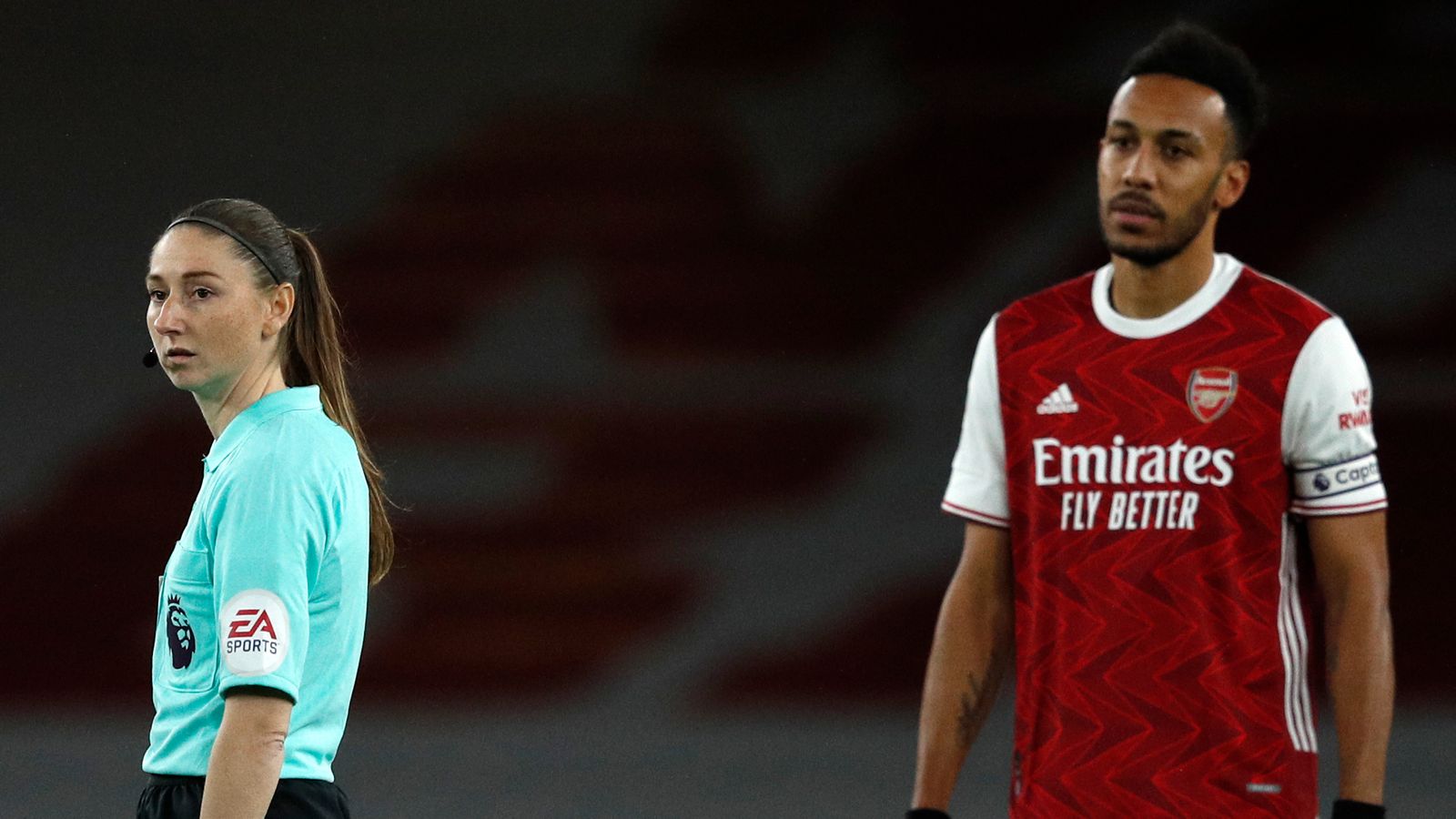
Sian Massey-Ellis tells Sky Sports’ Kate Mason people must be held accountable for social media abuse; she accepts officials will make mistakes and wants to pave the way for more women to reach the top of sport; Massey-Ellis has been a Premier League assistant referee since 2010
By Kate Mason
Sian Massey-Ellis talks about the benefits of VAR, dealing with mistakes, being a trailblazer for women in sport, and tackling online hate.
Massey-Ellis has been a Premier League assistant referee since December 2010 and made history last season when she became the first English woman to officiate in a men’s European fixture.
Sky Sports’ Kate Mason spoke to Massey-Ellis to learn more about her football journey after over a decade in England’s top division…
“It’s important that people understand that we’re humans behind that shell,” Massey-Ellis says.
“I want children to grow up in this generation, knowing that abuse is not OK. So I think the more we do that kind of work [in the community, speaking in interviews], the more people see us as people.”
Massey-Ellis has had to battle harder than most match officials to be seen as just another person. As the highest-ranked female official in the UK, she’s experienced a level of intense scrutiny that would have deterred many others.
She is motivated by her desire to change perceptions, and to show kids who might be interested in refereeing that there is a place for them.
But what would she expect a little girl who dreams of refereeing to make of some of the abuse and media storms Massey-Ellis herself has had to face?
“I hope that she looks at that and thinks, well, she can come through it and that we can change society and the culture, and that we can get this message out there that abuse isn’t OK or that it’s not OK to say something about somebody’s gender.
“If we can change that stereotype, then actually the children that are coming through today won’t have to deal with that in 20 years’ time.”
It’s significant that throughout her 10-year professional career in football, Massey-Ellis has never sought to make it about her gender, and never complained about the slow drawn-out process of returning to elite refereeing fitness after having a baby.
It’s everyone else that does, including me, on a windy afternoon on the community football pitch in Coventry where she trains.
What about the Sergio Aguero incident, where the Manchester City striker grasped her neck while arguing a point?
“I didn’t think anything of it, I’m so focussed on talking to the referee.”
I mention some people thought it was condescending.
“I think people can view it in a different way and each to their own opinion, really. You know, you can look at a situation from one angle or another, I suppose, just me being there in that situation. I didn’t really think about it twice.”
What about being an inspiration to female refs coming up through the game?
“I kind of just do my job,” she says. She does not see herself as an inspiration to others but knows she can make a big impact.
“I just think that it is important that we do have role models, just to be able to see that it is achievable. So if people look at me like that, I can only go, that’s great. So if we have another five female referees because they’ve seen me on the telly, then that’s great news really.”
On abuse from the stands, she says: “I don’t hear it.
“I always say at the grassroots level when there’s kind of one parent stood on the sidelines shouting, you can hear every word they say, but you’ve got 30,000. You can’t hear a word they’re saying, to be honest!”
Massey-Ellis is an important figure to many people. Since that high ponytail flicked into view in August 2009 at Edgar Street, running the line in the Football League for the first time, she’s shown any role in football can be one for the girls.
Her experience of officiating includes the FIFA Women’s World Cup, U20 World Cup, UEFA Women’s Euro, and UEFA Women’s Champions League Final, and she is regularly chosen for matches in the Premier League, WSL, and EFL.
And with Stephanie Frappart becoming the first woman to referee in a World Cup Qualifier last week, there are now few places women in football can no longer go.
Certainly, that’s how England’s highest-ranked female referee Rebecca Welch sees it.
“Sian has paved the way not just for female officials within England but across Europe as well. Because of that, it’s probably a lot easier for me than it was for Sian.
“She’s out there in the Premier League owning it, doing her job. That’s what she wants to be known as – a good assistant referee.”
Massey-Ellis has more than earned that tag. With every single decision scrutinised and graded every time she works, it’s a constant fight for any elite referee to stay in the Select Group that officiates Premier League games. And no one finds mistakes as upsetting as she does.
“There’s not that many jobs where every decision that you make is analysed on live TV. So, you have to think that if I made as few mistakes as I do in a Premier League game, as on a normal job, that’d be OK.
“So actually, you kind of have to think of it like that – put it into perspective that the odd mistake is OK. A couple of mistakes a season is probably within our human limit.”
Add that to the recent changes in the game with the introduction of VAR, and her job is constantly evolving. From the outside, it seems to be getting increasingly difficult.
She says: “It is a really difficult skill to learn, because now instead of saying ‘offside’ [straight away], I’m saying ‘delay! Stop, keep your flag down!’ I sometimes want to get some stones in my hands, so I don’t put the flag up too quick.
“It was a really steep learning curve, you know, trying to change what you’ve been doing for the last 20 years.”
Outside the professional game, Massey-Ellis continues to attract fans like me – with 14,000 people following a page set up in her honour on Facebook – and Henry Winter eulogising about her quality in The Times. Though she claims never to get recognised, “unless I’ve got my referee uniform on, people completely don’t know who I am”.
However, there is a well-documented darker side to the life of a professional referee. Sky Sports has campaigned against online hate, and outside the pandemic, packed stadiums are hotspots for abuse too.
Massey-Ellis thinks we all have a role to play in changing attitudes.
“It’s really important that everybody stands up to that behaviour – that’s the only way we change things. And I think that doesn’t have to be confrontational change.
“It’s about challenging things on an individual basis, reporting abuse. There’s lots of initiatives out there. And the more the better for me about challenging any sort of behaviour that isn’t appropriate and that can be any type. And I think if we stand up for what’s right, then that’s what’s important.
“Sometimes people are too quick to say things. And I think that, yeah, they should think before they speak and if they don’t have anything nice to say, don’t say anything at all! That’s what my parents always told me when I was little.”
Despite the aggression she often encounters on the pitch, she has used her friends, family and other officials for support.
She has one memory from university: “I remember coming off a game and a manager gave me absolute abuse, like it was horrendous – he thought I was the worst referee he’d ever seen. I probably didn’t have a great game.”
Even with her diminutive size which is “a whole five-foot-two-and-a-half”, Massey-Ellis says she’s never felt physically unsafe in football.
Interestingly she believes the sport is a great career for parents. Her daughter seems to inspire her even more to want to improve the game. At five years old, she knows what Massey-Ellis does, and has even seen her officiate some big games including the Community Shield at Wembley when she was the first woman to officiate in the competition.
“She’s always talking to her friends at school about what mummy does for a job and where I was at the weekend. I hope that shows her that she can be whatever she wants to be when she’s grown up”.













